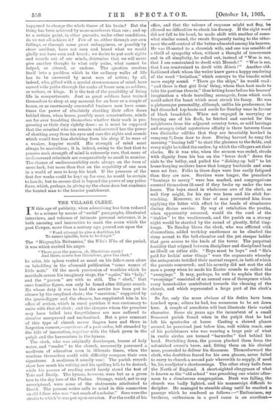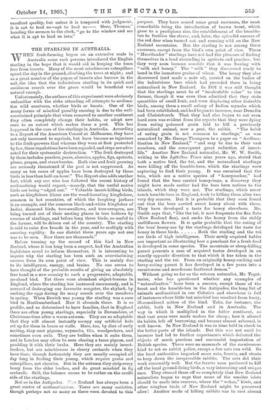"Fond attempt to give a deathless lot To names ignoble,
born to be forgot."
The " Biographia Britannica," the Who's Who of the period, it was which excited his anger.
"There goes the parson, oh, illustrious spark !
And there, scarce less illustrious, goes the clerk," he cries, his spleen vented as usual on his fellow-men alone on beholding in the aforesaid publication "some names of little note." Of the mock procession of worthies which be marshals across his imaginary stage, the "squire," his "lady," and the " parson " are with us still. The " clerk," that once familiar figure, can only be found after diligent search. He whose duty it was to lead the service has been put to silence by the surpliced choir; the "sacristan," supported by the grave-digger and the cleaner, has supplanted him in his office of sexton, which in rural parishes it was customary to unite with that of clerk ; and the sleepers whom the preacher may have lulled into forgetfulness are now suffered to slumber unreproved and unchastised. But a poor remnant of this type of church server lingers here and there in forgotten corners,—survivors of a past order, left stranded by the tide of innovation, together with the black gown in the pulpit and the harmonium in the hymns.
The clerk, who was originally doorkeeper, bearer of holy water, and " reader " to the church, necessarily possessed a modicum of education even in illiterate times, when the wardens themselves could with difficulty compass their own signatures. A modicum it usually was ! The parish records show how much his writing and his spelling left to be desired, while his powers of reading could barely stand the test of Tate and Brady. The hymns, however, were but as a green tree to the dry tree of the Psalms. Strange, weird, not to say unscriptural, were some of the statements attributed to David. The present writer calls to mind in this connection an old fallow who was "not much of a scholar." Sore were the straits to which 7.11-, was put upon occasion. For the credit of his office, and that the volume of response might not flag, he allowed no difficulties to check his fluency. If the right word did not fall to his hand, he made shift with another of some- what similar sound, the result frequently taxing to the utter- most the self-control of the better educated among his hearers. He was ill-mated to a shrewish wife, and one was sensible of a thrill of sympathy when, without a thought of irreverence and in all simplicity, he rolled out, instead of "Woe is me, that I am constrained to dwell with Mesech ! " "Woe is me, that I am constrained to dwell with Missis !" Another old- fashioned clerk whom the writer knew gave a happy rendering of the word "leviathan," which conveys to the bucolic mind mere empty sound. "There go the ships," he would read : "and there is that girt livin' thing, whom thou hast made to take his pastime therein," thus letting loose before his hearers' imagination a whole travelling menagerie, from which each could select the beast which most struck his fancy. He was a picturesque personality, although, unlike his predecessor, he had discarded top-boots and cords for Sunday wear in favour of black broadcloth. When not engaged in marrying or burying one of his flock, he fetched and carried for the neighbours from the adjacent country town, or sold herrings and oranges (what mysterious affinity is there between these two dissimilar edibles that they are invariably hawked in company ?) from door to door. During harvest he rang the morning " leazing bell" to start the gleaners to the fields, and every night he tolled the curfew, by which the villagers set their clocks. He it was who, when the sermon was ended, strode with dignity from his box on the "lower deck" down the aisle to the belfry, and pulled the "dishing-up bell" to let home-keeping mothers know that hungry husbands and sons were set free. Folks in those days were less easily fatigued than they are now. Services were longer, the preacher's "leanings to mercy" were less marked, and congregations counted themselves ill-used if they broke up under the two hours. The boys stood in wholesome awe of the clerk, as well they might, for his eye was keen and his stick far- reaching. Moreover, no fear of man prevented him from applying the latter with effect to the heads of slumberers during divine service. By way of retaliation the youths, when opportunity occurred, would tie the cord of the " tinkler " to the weathercock, and the parish on a stormy night would be startled by the sound of ghostly, fitful ting- tangs. To Sunday blows the clerk, who was afflicted with rheumatism, added weekday anathemas as he climbed the steep ascent to the bell-chamber and the yet steeper ladder that gave access to the leads of the tower. The perpetual hostility that reigned between discipliner and disciplined bred no illwill on either side. "Boys must be boys" and "He's paid for lookin' arter things" were the arguments whereby the antagonists testified their mutual respect, in both of which the parents concurred ; and his severity did not cost the old man a penny when be made his Easter rounds to collect the "sweepings." It may, perhaps, be well to explain that the "sweepings" consisted of an annual sum of threepence which every householder contributed towards the cleaning of the church, and which represented a large part of the clerk's salary.
So far, only the more obvious of his duties have been touched upon; others he had, too numerous to be set down here. A couple of anecdotes will best illustrate their varied character. Some six years ago the incumbent of a small Somerset parish found when in the pulpit that he had left his spectacles at home. Casting a shrewd glance around, be perceived just below him, well within reach, one of his parishioners who was wearing a large pair of what in rustic circles are termed " barnacles " tied behind his head. Stretching down, the parson plucked them from the astonished owner's brow, and, fitting them on his clerical nose, proceeded to deliver his discourse. Thenceforward the clerk, who doubtless feared for his own glasses, never failed to carry to church a second pair wherewith to supply, if need be, his coadjutor's shortcomings. The other story hails from the North of England. A short-sighted clergyman of what is known as the "old school" was preaching one winter after- noon to a slumberous congregation. Dusk was falling, the church was badly lighted, and his manuscript difficult to decipher. He managed to stumble along until he reached a passage Which he rendered as follows :—" Enthusiasm, my brethren, enthusiasm in a good Cause is an excellent—. excellent quality, but unless it is tempered with judgment, I it is apt to lead us—apt to lead us— Here, Thomas," handing the sermon to the clerk, "go to the window and see what it is apt to lead us into."















































 Previous page
Previous page